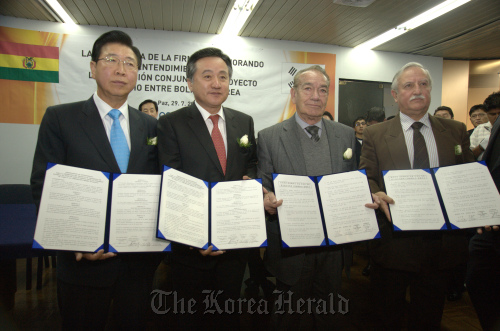A Korean consortium forged an agreement with Bolivia’s state-run miner Comibol on Saturday to set up a joint venture to manufacture lithium-ion battery parts, boosting Korea’s bid to preemptively tap the vast Latin American mineral deposits.
Under the deal, the Korea Resources Corp., POSCO and Comibol will form a task force next month or so to discuss details, a KORES official said. The scale of investment and the launch date of the establishment are still to be settled.

POSCO chief executive Chung Joon-yang (far left), Korea Resources Corp. President Kim Shin-jong (second from left), Comibol President Hugo Miranda Rendn (third from left) and Bolivian Mining and Metallurgy Minister Luis Alberto Echazu pose after signing a memorandum of understanding to establish a lithium-battery joint venture on Saturday in La Paz, Bolivia. (KORES)
SK Innovation and LG Chem are also likely to participate in the project, KORES said in a statement.
The deal makes Korea the first country to do battery business with Bolivia, home to the world’s largest lithium reserves with estimates of 5.4 million tons. The soft, silver-white metal is widely used in rechargeable batteries for mobile phones, laptops and electric cars.
About 10 countries including the U.S., Japan, France and Brazil competed to partner with the Latin American nation, the state-run mineral developer said.
“The agreement will enable Korea to gain the upper hand over them,” said Kim Shin-jong, KORES president. “Korea’s advanced technology and Bolivia’s resources will create synergy.”
Korea has been spurring its drive to secure scarce minerals in the Latin American region. The joint venture will also pave the way for Asia’s fourth-largest economy to take part in a project to develop lithium carbonate in the region, officials said.
As part of the deal, the Korean companies will send officials next month to the Salar de Uyuni, the world’s largest salt flat in southern Bolivia for a joint research project involving extracting lithium, KORES said.
POSCO, the world’s fourth-largest steelmaker, also plans to bid for construction of lithium-carbonate manufacturing and processing facilities in Uyuni, it added.
Korea imports all of its lithium needs, which nearly doubled to 11,000 tons last year compared with 5,200 tons in 2008.
Prices reached $4,752 per ton as of July 28, up $200 compared with last month and almost 100 percent from 2003, government data show.
The global lithium market has been expanding by 6 percent annually since 2000, according to KORES. It forecasts the rate will top 20 percent in the coming years as demand spikes for electric cars, whose batteries carry a massive volume of lithium.
The government aims to raise the combined self-sufficiency rate for lithium and other rare metals to 10 percent this year as “national strategic resources.”
In July, it built an offshore plant in Gangneung in the country’s east with POSCO to extract lithium from seawater, aiming to churn out 10,000 tons annually starting in 2020.
The Pohang-based steelmaker has been looking to become an “all-round materials developer” by branching out to metals like lithium, magnesium and nickel. It struck a deal in May with Peru-based Li3Energy to dig up lithium in Chile.
By Shin Hyon-hee (heeshin@heraldcorp.com)






